Back to the Brink
Adam Shaw compares today with the 70s

Adam Shaw
Times are tough, people worry that we're facing a dismal future. No growth, high unemployment, deep cuts and little hope.
Clapham, south-west London, for most of the past 100 years or so this has been home to the ordinary man on the street. Average income, average
house price, average lifestyle, home to the so-called Clapham Omnibus.
So how's the ordinary man on the Clapham Omnibus going to cope with the
financial and economic challenges we're facing today. Well, he's been there before.
The 1970s began with such hope but ended with strikes, crippling public finances and soaring prices. It resulted in political and economic
revolution and massive social upheaval.
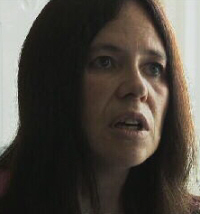
Hayley Gaye
Margaret Thatcher "The land of hope and glory has become the land of beg and borrow!"
On the surface, we've come a long way from the dark days of the 70s but could today's crisis destabilise the country in a similar way. Well, it's
already having a severe impact on the lives of many ordinary people.
Hayley Gaye, is a single working mum living in South London. She's juggling her role as a school administrator and bringing up her two children.
Hayley "The situation is, you get your wages that come in once a month. You then have to budget that across the time, the fuel bill for instance,
electricity and gas and car bills are just spiralling out-of-control. You either buy food or buy by school shoes. And sometimes the school shoes just
have to be bought and therefore you downgrade on some of the food."
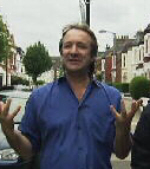
Neil Pearson
It must strike you as very odd that the very advanced, developed country like the UK places ordinary working people like you in a situation
where you have to decide between buying shoes for your kids to go to school or buying food.
But, Hayley's circumstances are not exceptional. One in five UK families admit they are now, financially, living on the edge.
One of the big financial strains for ordinary working people is the cost of housing. Back in the 70s, Clapham was seen as a stereotypical
home of the average man. The man on the Clapham Omnibus. And, there was good reason for that, houses and rents were far more affordable. Clapham
was a place where working-class people grew up. People like actor Neil Pearson.
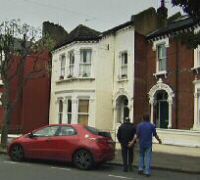
Neil Pearson's Flat
Neil Pearson "I know it was a fairly close-knit community because I did seem to know pretty much everyone who lived on the street."
When Neil was growing up on the street, living conditions were often poor and dilapidated. The kind we thought we'd left behind in the
archives of the 70s sitcom.
This two bedroom flat was home to Neil, his brother and sister and his mother. All three children shared one bedroom and there was no bathroom, just
a tin-bath sitting-room floor.
Neil Pearson "This is just like it was, I haven't been on here for 42 years, it's a little overwhelming"
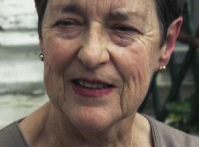
Yvonne Hunt
Yvonne Hunt and her husband have rented the flat since Neil's family moved out 40 years ago. While inside has remained remarkably unmodernised,
at the front door it's now a very different world.
Neil Pearson "Do you recognise much of Taybridge Road or Clapham as a whole from those times?"
Yvonne "It's all changed. More people, more money and the people that we know have either died or they've moved on."
Yvonne is one of the last survivors of a class that is no longer living on streets like this.
Neil Pearson "It was monolithically one class then, and it's monolithically one class now, just a different class."
The middle-class's moved in and gentrified the area, but the rise of financial services as the new engine of Britain's economy brought in an even
wealthier class.
So what sort of people could buy a house today?

Peter Rollings
Peter Rollings, chief executive with Marsh & Parsons "It would be bankers, stockbrokers. It would be accountants or lawyers. It's a fact,
if a house costs a million pounds you've got to be pretty well paid or independently wealthy to afford it."
These price tags have put Clapham beyond the dreams of the ordinary man from the Clapham Omnibus. In the 70s the average house prices where
three-times earnings, now it's over five times. In London it's a lot worse than that.
Pricing people out of their traditional neighbourhoods has made many working families feel increasingly marginalised.
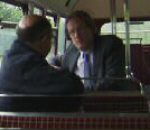
Alwyn Turner
Alwyn Turner, historian & author "The discrepancy between house prices and wages is so great now compared to where it was in the 70s when
things were affordable and achievable and we are now coming to a point where that isn't the case and aspiration, therefore, starts to fall
back. And when aspiration disappears, hope disappears"
For ordinary working professionals, getting the keys to an ordinary family-sized home can now involve moving many miles and hours from your
place of work.
It's a move that the Pilditch family felt forced to make, leaving their Clapham flat behind for a house 60 miles away in rural Berkshire.
Now, Justin a website designer and Rosanne who works as a personnel manager, each spend three hours a day commuting to and from work in London.
The notion of the squeezed middle is more than just middle-class moaning, average real earnings fell by over 3% in 2011 and that's the largest
one-year fall for 30 years. Little wonder the government's just reversed its plans to raise the duty on fuel.






